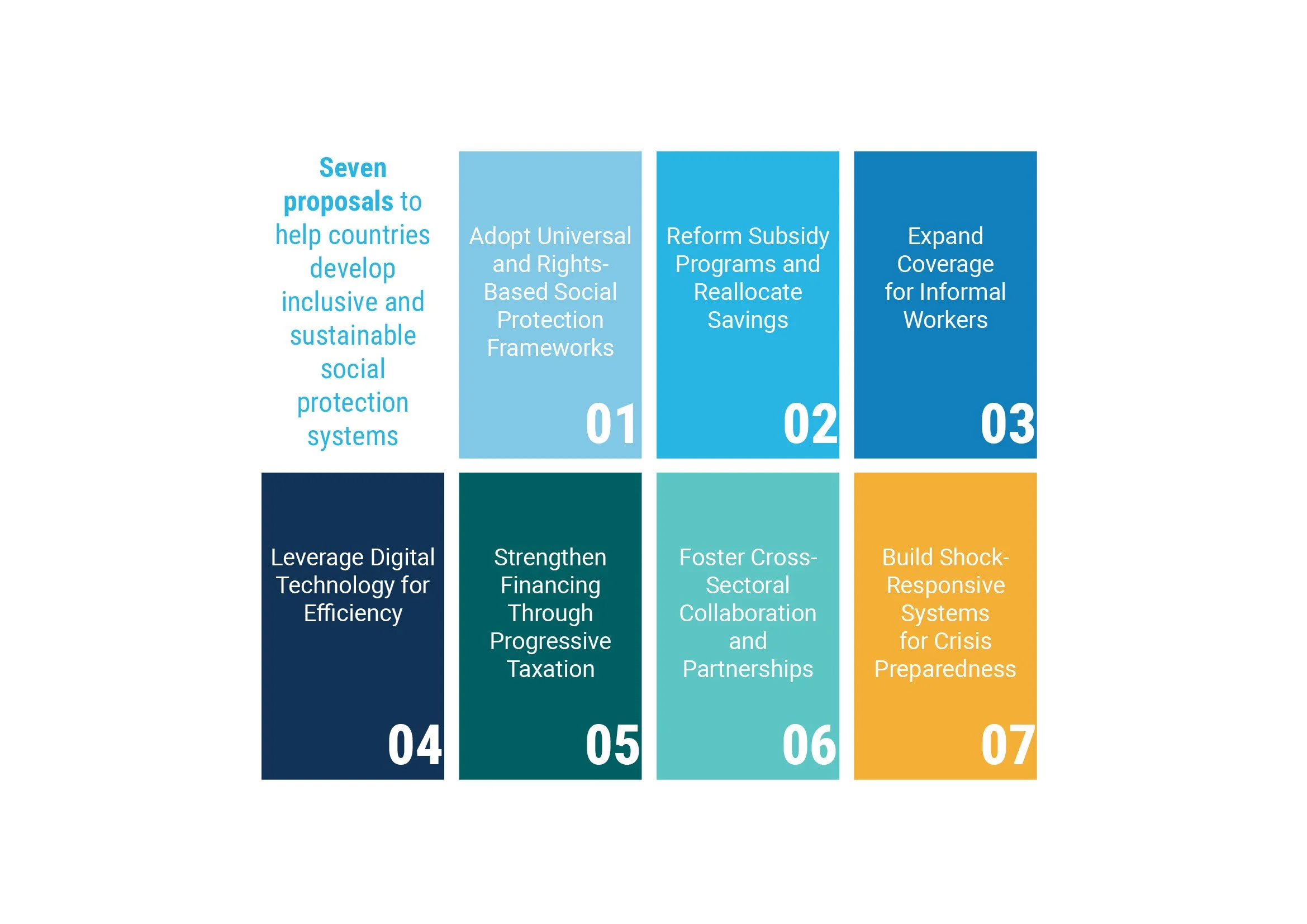Reimagining Social Protection in the Global South: A Path to Inclusion and Resilience
Reimagining Social Protection in the Global South: A Path to Inclusion and Resilience
Social protection, as defined by the International Labor Organization (ILO), encompasses policies and programs designed to reduce and prevent poverty and vulnerability throughout the life cycle. These measures provide income security and access to essential services, enhancing individuals' capacity to manage economic and social risks such as unemployment, exclusion, sickness, disability, and old age.
Adopting a life-cycle approach, social protection recognizes the diverse risks individuals face at different stages of life—childhood, youth, working age, and old age. Through tailored strategies and interventions, social protection seeks to mitigate these risks, empower individuals, and promote equitable access to resources and opportunities. The overarching objectives are to reduce poverty, combat inequality, and foster social and economic inclusion, with a particular focus on vulnerable groups such as children, women, persons with disabilities, the elderly, and those facing chronic poverty or malnutrition.
According to the World Bank, social protection systems comprise three pillars:
Social Assistance: Non-contributory programs that provide support to vulnerable populations, such as cash transfers, food assistance, and social services.
Social Insurance: Contributory programs that protect against lifecycle risks, including unemployment, health shocks, disability, and old age.
Labor Market Programs: Initiatives aimed at promoting employment opportunities, skill development, and income security, ensuring equitable participation in the workforce.
For countries in the global south, there lies a significant opportunity to develop and strengthen social protection systems. While countries might be facing challenges such as high unemployment, inequality, and economic shocks, these challenges can be addressed through innovative, inclusive, and sustainable social protection strategies. By leveraging international frameworks and local contexts, governments can create systems that not only respond to immediate needs but also build resilience for future generations.
Social protection is more than a safety net; it is a transformative tool that empowers individuals, strengthens communities, and contributes to sustainable economic growth. It is a fundamental human right, enshrined in the Universal Declaration of Human Rights and the ILO's Social Protection Floors Recommendation (No. 202). Governments should lead this effort, aligning national policies with international standards to ensure that no one is left behind.
The commitment to comprehensive and inclusive social protection systems will enable countries to turn their demographic and economic challenges into opportunities, fostering a future where all citizens can thrive.
Challenges of Social Protection During Poli-crises
Many countries are facing unique opportunities to build and strengthen social protection systems, but several challenges must be addressed to realize this potential. These challenges reflect structural and systemic constraints that can be overcome with targeted, collaborative efforts. Below are five key challenges, that highlight both obstacles and avenues for improvement:
Economic Constraints
Many countries fall into lower-middle or low-income categories. Limited fiscal space restricts their ability to allocate sufficient resources to social protection systems. However, strategic prioritization and efficient reallocation of existing budgets such as reducing reliance on generalized subsidies, can create room for more impactful program
Fragmented Systems
Social protection frameworks are often fragmented, relying heavily on public-sector employment and social insurance for formal workers. Universal subsidies for food and energy complement a patchwork of narrowly targeted safety-net programs. This structure, while historically rooted in many countries’ labor market and social contract, leaves many vulnerable groups uncovered. A more integrated approach could ensure broader and fairer coverage.
Inefficient Subsidies
Energy and food subsidies consume a significant portion of national budgets, often exceeding global averages. These subsidies are economically inefficient and environmentally unsustainable, disproportionately benefiting wealthier households due to their higher consumption. Replacing universal subsidies with targeted cash transfer programs can redirect resources to those who need them most, while also fostering environmental sustainability.
Unsustainable Pension Schemes
Pension systems are frequently financially unsustainable, burdened by generous designs and limited contributions. Reforming these schemes to balance adequacy and sustainability—while expanding coverage to informal and self-employed workers—can secure the future of social protection for an aging population.
Weak Labor Market Protections
Labor market policies, while often aligned with international standards, are poorly enforced. Informal workers, who form a significant majority of the workforce, lack basic protections and access to social insurance. Expanding enforcement capacity and designing inclusive employment programs could enhance protection for vulnerable workers and promote economic inclusion.
While these challenges are significant, they present an opportunity for innovation and reform. By adopting more inclusive policies, improving governance, and fostering multi-stakeholder collaboration, countries can build resilient social protection systems that leave no one behind. Addressing these issues is not only a moral imperative but also an investment in countries’ social and economic future.
Rethinking Social Protection System
Countries in the global south might be standing at a critical juncture, where persistent inadequacies in social protection systems demand a transformative approach. For decades, these systems have struggled to address the needs of diverse populations in a sustainable, meaningful, and shock-responsive manner. As economic, environmental, and social pressures intensify, a fundamental shift is required: from fragmented, exclusionary frameworks to inclusive, universal systems that prioritize equity, resilience, and adaptability.
A comprehensive social protection system must no longer be seen as a temporary or crisis-driven intervention but as a permanent, foundational element of social and economic policy. Universal systems safeguard against poverty, protect livelihoods, and provide the stability needed for individuals and communities to thrive. Beyond their social importance, such systems are critical for economic growth, enabling countries to better withstand and recover from future shocks, including those linked to climate change.
This shift requires visionary leadership, commitment to implementation, and actionable strategies. Below are seven proposals to help countries develop inclusive and sustainable social protection systems:
1. Adopt Universal and Rights-Based Social Protection Frameworks
Governments should commit to universal social protection systems that guarantee every individual’s right to social security, as enshrined in international human rights frameworks. This includes prioritizing the inclusion of informal workers, marginalized communities, and other underserved groups. Establishing such systems will require aligning national policies with international declarations.
2. Reform Subsidy Programs and Reallocate Savings
Subsidy reforms, particularly in energy and food, can unlock significant fiscal space. Phasing out generalized subsidies and replacing them with targeted cash transfer programs will ensure resources reach the most vulnerable while reducing inefficiencies and environmental harm. This reallocation can also address systemic inequities, as wealthier households often benefit disproportionately from subsidies.
3. Expand Coverage for Informal Workers
Informal workers constitute a significant portion of the workforce in many countries but remain excluded from most social protection programs. Governments should design flexible, contributory schemes tailored to the realities of informal employment. Such initiatives can draw lessons from global examples, like India’s Social Security Code, which extends protections to informal and gig workers.
4. Leverage Digital Technology for Efficiency
Technology offers transformative potential for the registration, delivery, and monitoring of social protection programs. Digital platforms can streamline beneficiary identification, reduce errors, and ensure timely cash transfers. Leveraging mobile technology and digital payment systems can also enhance accessibility for rural and remote populations.
5. Strengthen Financing Through Progressive Taxation
Securing sustainable financing is essential for universal social protection. Governments should explore progressive taxation mechanisms, including taxes on wealth, luxury goods, and high-carbon activities. These measures not only generate revenue but also contribute to reducing inequality and promoting environmental sustainability.
6. Foster Cross-Sectoral Collaboration and Partnerships
Effective social protection requires the collaboration of multiple stakeholders, including governments, private sector actors, international organizations, and civil society. Governments must take the lead in harmonizing efforts, ensuring that programs are integrated and complementary. Partnerships can also help mobilize resources and technical expertise to fill capacity gaps.
7. Build Shock-Responsive Systems for Crisis Preparedness
Social protection systems must be designed to respond dynamically to crises, whether economic, environmental, or health-related. Lessons from the COVID-19 pandemic underscore the importance of rapid-response mechanisms that can expand coverage and scale benefits during emergencies. Creating contingency funds and adaptive safety nets will enhance resilience.
Committing to Building Inclusive and Resilient Social Protection Systems
Beyond Group, through extensive collaboration with governments, development partners and INGOs, has been a catalyst for transformative change in social protection. By combining strategic expertise, implementation experience, and credibility, we have played a key role in advancing the social protection reform agenda. Our work spans developing strategic frameworks for INGOs, integrating humanitarian assistance with social protection systems through the humanitarian-development-peace (HDP) nexus, and embedding gendered perspectives to make systems more inclusive. Notably, Beyond Group contributed to Lebanon’s National Social Protection Strategy in partnership with the Ministry of Social Affairs, underscoring our dedication to systemic reform across the region.
Central to Beyond Group’s approach is our commitment to participatory, agile, and innovative methodologies. We believe in co-creating solutions with governments, organizations, and communities, recognizing all stakeholders as equal partners in shaping sustainable and impactful reforms. This participatory philosophy fosters shared ownership and accountability, enabling beneficiaries and stakeholders to actively engage in building systems that truly serve their needs.
Our agility and focus on innovation empower us to adapt to evolving challenges and seize opportunities for impactful change. Whether through leveraging cutting-edge tools, championing inclusive frameworks, or facilitating cross-sectoral collaboration, we strive to ensure that social protection systems are not only comprehensive but also dynamic and resilient.
As we look to the future, Beyond Group remains committed to support the transformation of social protection systems. By fostering inclusive, participatory processes and embracing innovation, we aim to co-create systems that are comprehensive, resilient, and responsive to the diverse needs of all individuals. Together with our partners, we will continue to strive towards advancing this vision and ensuring that no one is left behind.


